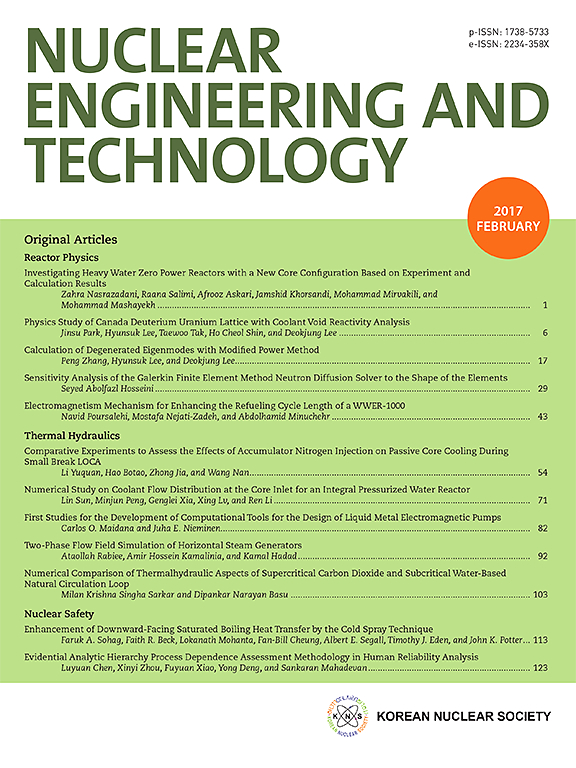Investigation of ensemble Kalman filter-based data assimilation for turbulent flow in a 3×3 rod bundle
IF 2.6
3区 工程技术
Q1 NUCLEAR SCIENCE & TECHNOLOGY
引用次数: 0
Abstract
Computational Fluid Dynamics (CFD) has advanced rapidly in reactor core thermal-hydraulics, serving as a vital tool for nuclear reactor safety and performance analysis. This study addresses uncertainties in complex turbulence simulations within reactor cores, proposing a novel approach to optimize Reynolds-Averaged Navier-Stokes (RANS) models using the Ensemble Kalman Filter (EnKF) data assimilation method. By simulating turbulent flow in a 3 × 3 rod bundle channel and using time-averaged velocity fields from Particle Image Velocimetry (PIV) as observational data, an observation operator maps local velocity measurements to full-field turbulence parameters, optimizing key RANS closure parameters. Results show that the EnKF-optimized RANS model significantly improves the accuracy of velocity and turbulent kinetic energy predictions, with relative errors below 1 % in most regions, outperforming the original model. This approach provides a data-driven optimization paradigm for high-fidelity reactor thermal-hydraulic simulations, supporting complex confined turbulence modeling and multi-physics coupling analysis. However, further validation is needed to explore additional factors affecting assimilation performance in nuclear reactor systems.
基于集合卡尔曼滤波的3×3棒束湍流数据同化研究
计算流体力学(Computational Fluid Dynamics, CFD)在反应堆堆芯热工水力学研究中发展迅速,已成为核反应堆安全与性能分析的重要工具。本研究解决了反应堆堆芯内复杂湍流模拟中的不确定性,提出了一种利用集合卡尔曼滤波(EnKF)数据同化方法优化reynolds - average Navier-Stokes (RANS)模型的新方法。通过模拟3 × 3棒束通道中的湍流,利用粒子图像测速(PIV)的时间平均速度场作为观测数据,观测算子将局部速度测量值映射到全场湍流参数,优化关键RANS闭合参数。结果表明,经enkf优化后的RANS模型显著提高了速度和湍流动能预测的精度,大部分区域的相对误差在1%以下,优于原模型。该方法为高保真反应堆热工模拟提供了数据驱动的优化范例,支持复杂的受限湍流建模和多物理场耦合分析。然而,需要进一步验证以探索影响核反应堆系统同化性能的其他因素。
本文章由计算机程序翻译,如有差异,请以英文原文为准。
求助全文
约1分钟内获得全文
求助全文
来源期刊

Nuclear Engineering and Technology
工程技术-核科学技术
CiteScore
4.80
自引率
7.40%
发文量
431
审稿时长
3.5 months
期刊介绍:
Nuclear Engineering and Technology (NET), an international journal of the Korean Nuclear Society (KNS), publishes peer-reviewed papers on original research, ideas and developments in all areas of the field of nuclear science and technology. NET bimonthly publishes original articles, reviews, and technical notes. The journal is listed in the Science Citation Index Expanded (SCIE) of Thomson Reuters.
NET covers all fields for peaceful utilization of nuclear energy and radiation as follows:
1) Reactor Physics
2) Thermal Hydraulics
3) Nuclear Safety
4) Nuclear I&C
5) Nuclear Physics, Fusion, and Laser Technology
6) Nuclear Fuel Cycle and Radioactive Waste Management
7) Nuclear Fuel and Reactor Materials
8) Radiation Application
9) Radiation Protection
10) Nuclear Structural Analysis and Plant Management & Maintenance
11) Nuclear Policy, Economics, and Human Resource Development
 求助内容:
求助内容: 应助结果提醒方式:
应助结果提醒方式:


